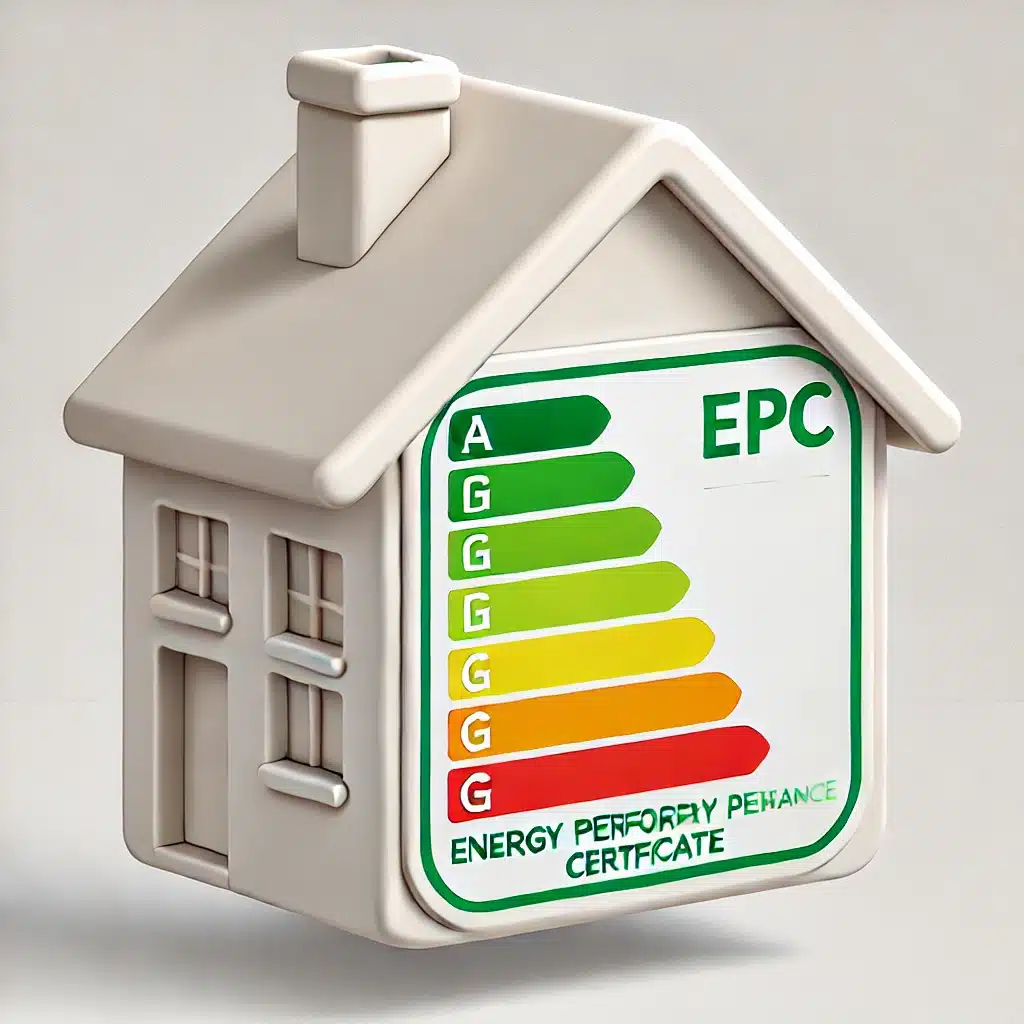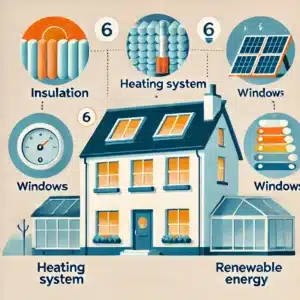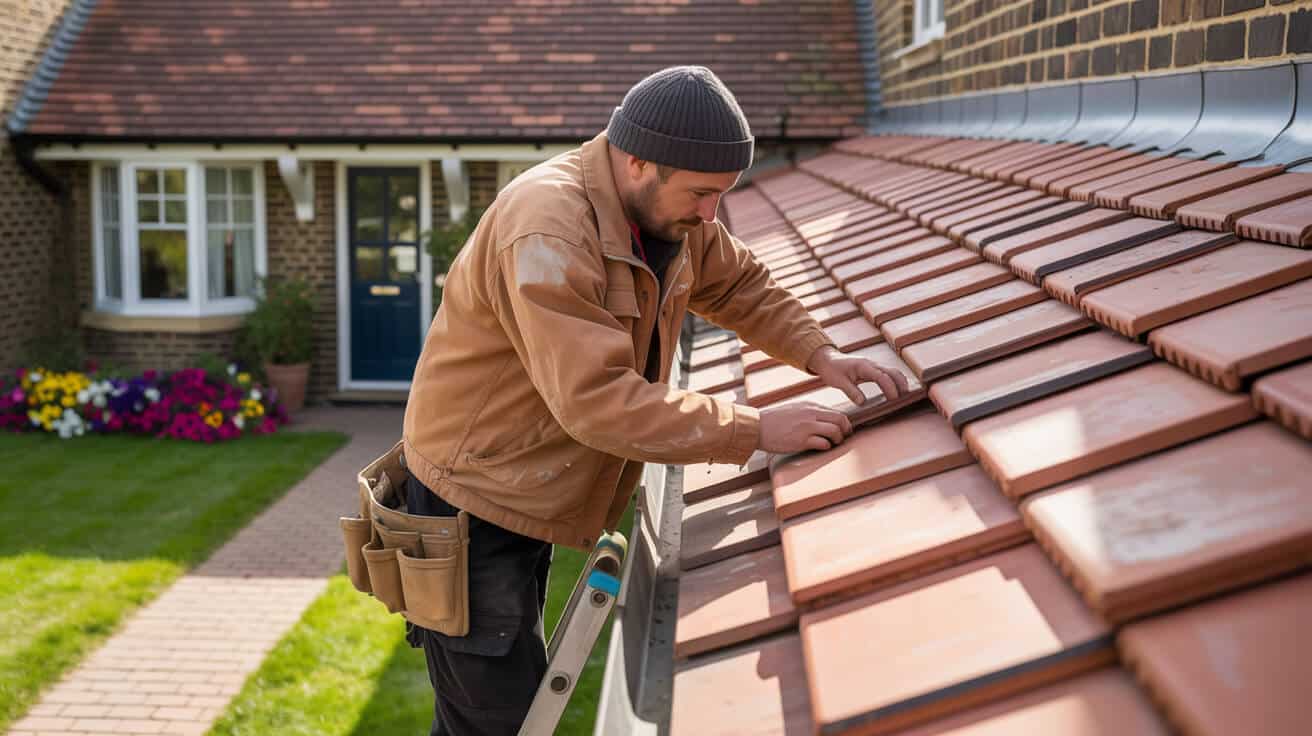 The Complete Guide to Energy Performance Certificates (EPCs)
The Complete Guide to Energy Performance Certificates (EPCs)

In the world of real estate and energy conservation, understanding Energy Performance Certificates (EPCs) is crucial. Whether you’re buying, selling, or want to reduce your carbon footprint, an EPC plays a vital role. It provides insights into a property’s energy efficiency and helps you make informed decisions.
Table of Contents:
- What is an Energy Performance Certificate?
- Why is an Energy Performance Certificate Important?
- Decoding Your EPC Rating:
- Improving Your EPC Rating:
- Navigating Energy Performance Certificates: England, Wales, Scotland, and Northern Ireland
- FAQs about Energy Performance Certificates
- Conclusion
What is an Energy Performance Certificate?

An Energy Performance Certificate (EPC) is a standardised indicator of a property’s energy efficiency. It assesses various factors contributing to a home’s energy consumption and carbon dioxide emissions, like a nutritional label for your house.
The EPC assigns a rating from A (highly efficient) to G (inefficient) based on these factors. This rating gives potential buyers and renters a clear picture of the property’s energy performance.
Why is an Energy Performance Certificate Important?
A good EPC rating offers several benefits, making it an important consideration for both homeowners and potential buyers. Here are some key reasons why an EPC is so important:
Financial Savings:
A higher EPC rating can mean lower energy bills. With greater energy efficiency, you’ll likely use less electricity and gas, saving you money over time.
As energy prices continue to rise, an energy-efficient home offers a significant financial advantage. A good EPC rating can make a real difference in your monthly expenses.
Environmental Responsibility:
A good EPC rating signals a lower carbon footprint. By consuming less energy, you contribute to a greener environment and reduce greenhouse gas emissions, aiding the fight against climate change.
Choosing a property with a good EPC rating aligns with a more sustainable lifestyle, making a positive environmental impact.
Increased Property Value:
Homes with better EPC ratings are generally more attractive to buyers. This is because environmentally conscious buyers often prioritise energy efficiency.
A good EPC can boost your property’s value and make it stand out in a competitive market. It is a valuable selling point that can attract potential buyers.
Decoding Your EPC Rating:
Several factors contribute to an EPC’s grading system. Understanding these elements can help you interpret your EPC rating and identify areas for improvement:
Insulation:
Your home’s insulation is carefully assessed during an EPC assessment. The amount of heat retained within your walls, roof, and floors significantly impacts the rating.
The better insulated your property is, the higher the EPC rating. Adequate insulation prevents heat loss, leading to lower energy consumption and improved efficiency.
Heating System:
The type and age of your boiler and heating system are crucial factors. Modern, efficient heating systems result in a higher EPC score compared to outdated ones.
The Energy Saving Trust provides valuable resources on boilers and heating systems. Visit the Energy Saving Trust website for more information.
Windows:
Window type – single, double, or triple-glazed – affects heat loss. Upgrading to double or triple glazing, especially from single-glazing, can improve your EPC rating.
These window types provide better insulation, reducing heat transfer and enhancing energy efficiency. This leads to a more comfortable living environment and lower energy bills.
Renewable Energy:
Homes using renewable energy, like solar panels or heat pumps, often receive higher EPC scores. The government encourages sustainable energy solutions, so these installations are viewed favourably.
Renewable energy sources reduce reliance on traditional energy sources, lowering both your carbon footprint and energy bills. They also add value to your property.
Improving Your EPC Rating:
Improving your property’s energy performance is achievable. Implementing some key strategies can lead to a more energy-efficient and environmentally friendly home:
1. Insulation Upgrades:
Optimising insulation is one of the most effective ways to raise your EPC rating. Consider adding loft insulation, cavity wall insulation, or external wall insulation for solid-walled properties.
While there are upfront costs, the potential long-term energy cost savings make it worthwhile. It is a smart investment that pays off over time.
The table below, based on Energy Grants Calculator data, shows estimated costs and potential benefits of different insulation methods:
| Improvement | Indicative Cost | Typical Savings Per Year | Energy Rating After Improvement | Green Deal Finance? |
|---|---|---|---|---|
| Internal/External Wall Insulation | £4,000 – £14,000 | £510 | E51 | Yes |
| Floor Insulation (Suspended Floor) | £800 – £1,200 | £73 | E53 | Potential upfront contributions required |
| Hot Water Cylinder Insulation | £15-£30 | £94 | D56 | Yes |
Even small improvements can yield significant long-term benefits, both in energy cost savings and potential EPC rating improvements. Every step towards better insulation counts.
2. Heating System Enhancements:
Your heating system significantly impacts your home’s energy consumption and EPC rating. Modern, energy-efficient boilers can considerably reduce gas usage compared to older models.
This not only improves your EPC rating but also potentially leads to significant cost savings. Investing in an efficient heating system is a crucial step in optimising your property’s energy performance.
3. Double or Triple-Glazing:
If you have single-glazed windows, replacing them with double or triple-glazed alternatives is another impactful way to reduce heat loss.
While window replacement requires an initial investment, the potential long-term energy bill cost savings and increased home comfort make it a worthwhile investment, all while boosting your EPC score. It is a decision that positively impacts both your finances and your living environment.
4. Lighting:
Switching to energy-efficient LED lighting can make a difference. Though its individual impact on your EPC rating might be small, combined with other energy-saving measures, it contributes to a greener and more cost-effective home.
LED lights use significantly less energy than traditional incandescent bulbs, resulting in reduced energy consumption and lower electricity bills. While seemingly minor, these changes add up over time.
5. Renewable Energy Sources:
Embracing renewable energy options like solar panels not only benefits the environment but also potentially increases your property’s market value.
Incorporating eco-friendly elements within your home appeals to potential buyers as the world shifts toward greener solutions. It showcases your commitment to sustainability and adds a unique selling proposition to your property.
While these are just a few potential methods for Improving Your EPC Rating, note that specific suitable measures may vary. Seeking guidance from a qualified energy assessor for personalised recommendations is highly advisable. They can provide tailored advice based on your property’s unique characteristics.
Navigating Energy Performance Certificates: England, Wales, Scotland, and Northern Ireland
Energy Performance Certificates differ slightly across England, Wales, Scotland, and Northern Ireland. Understanding these nuances is essential, especially when dealing with properties in different regions.
England and Wales:
Properties in England and Wales must have a valid EPC before being listed for sale or rent. The EPC is generally valid for 10 years.
Failing to provide a valid EPC could lead to financial penalties. Ensure you comply with the regulations to avoid any legal issues during property transactions.
Visit Landmark’s official website for certified EPC organisations in England and Wales and to access the EPC register. For comprehensive information about EPCs when buying or selling your home in England and Wales, refer to the dedicated EPC page on the UK government website.
Scotland:
Scotland mandates the display of the property’s EPC rating, for example, near the boiler or meter cupboard. This ensures transparency and allows potential buyers or renters to readily access this crucial information.
You’ll need to consult services specific to Scottish homes for EPC information, as it differs from England and Wales. For information, visit the Scottish Government’s Home Report pages.
Scotland also has the Home Report, which includes the EPC and other essential documents for those buying or selling property. This comprehensive report streamlines the process and provides valuable insights.
Northern Ireland:
Like other parts of the UK, properties in Northern Ireland require a valid EPC before sale or rental. This legal requirement ensures that energy efficiency is considered in property transactions.
To explore recognised EPC organisations in Northern Ireland, visit the Landmark Northern Ireland site. The Department of Finance in Northern Ireland offers further details on their website. Their page on EPCs within Northern Ireland provides specific information.
FAQs about Energy Performance Certificates
Here are answers to some commonly asked questions about Energy Performance Certificates:
FAQ 1: Is it worth getting an Energy Performance Certificate?
Yes, getting an Energy Performance Certificate is definitely worthwhile. A good EPC can add value to your property, attract buyers, and contribute to a sustainable future.
With potential cost savings on energy bills, a reduced carbon footprint, and the fulfilment of legal obligations, investing in a good EPC rating is a wise decision.
FAQ 2: What is included in an Energy Performance Certificate?
An EPC is a detailed report on a property’s energy efficiency, grading it from A to G (A is excellent, G needs improvement). The EPC assessor considers factors such as wall insulation, loft insulation, boiler type, and hot water efficiency.
These assessments cover insulation, heating systems, and more, impacting your energy consumption and carbon footprint. It provides a comprehensive overview of your property’s energy performance.
FAQ 3: How much does an Energy Performance Certificate cost?
The EPC cost varies based on the property size, type, and the assessor. On average, expect to pay between £60 and £120.
It’s recommended to obtain quotes from several different assessors to compare prices and choose the best option for your needs.
FAQ 4: How do I get an EPC certificate for my house?
To obtain an EPC, you need to hire a certified domestic energy assessor. These professionals are qualified to assess your home and issue a valid certificate outlining its energy performance rating.
You can find accredited assessors online or through industry directories. Choose an assessor with a good reputation and relevant experience.
Conclusion
An Energy Performance Certificate is more than just a document – it offers valuable insights into a property’s energy efficiency and environmental impact.
As we become more aware of energy conservation and eco-friendly practices, understanding EPCs becomes paramount. By prioritising eco-conscious practices and understanding EPCs, we can create a more sustainable future.



